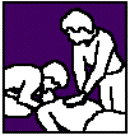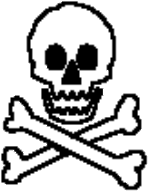PCP

Phencyclidine, commonly referred to as PCP, was developed
in 1959 as an anesthetic and was later
used in veterinary medicine as
a powerful tranquilizer.
Use of PCP in humans was discontinued in
1965, because
it was found that patients often became agitated,
delusional, and irrational while recovering from its anesthetic
effects. It is classified as a Schedule I,II
drug under the
Controlled Substances Act. PCP is illegally manufactured in
clandestine laboratories and is sold on the street by such names as
angel dust, crystal supergrass, killer joints, ozone, wack, and rocket
fuel. The variety of street names for PCP reflects its bizarre and
volatile effects.
PCP is a white crystalline powder that is readily soluble in water or
alcohol. It has a distinctive bitter chemical
taste. PCP can be mixed
easily with dyes and turns up on the illicit drug market in a variety
of tablets, capsules, and colored powders. It is normally used in one
of three ways: snorted, smoked, or eaten. For smoking, PCP is often
applied to a leafy material such as mint, parsley,
oregano, or
marijuana.

Health Hazards
PCP was first introduced as a street
drug in the late
1960s and quickly gained a reputation as a drug that
could cause bad reactions and was not worth the risk. Many people,
after using the drug once, will not knowingly use it again. Yet others
use it consistently and regularly. The reasons often cited by users as
factors in their continued PCP use are feelings of strength, power,
and invulnerability and a numbing effect on the mind that often
results in anger, rage, and the disappearance of unpleasant memories.
Recent studies, including those of men arrested for criminal activity,
indicate that if PCP induces violent or criminal behavior, it does so
infrequently.
At low to moderate doses, physiological effects of PCP include a
slight increase in breathing rate and a more pronounced rise in blood
pressure and pulse rate.
Respiration becomes shallow, and flushing
and profuse sweating occur. Generalized numbness of the extremities
and muscular in-coordination also may occur. Psychological
effects
include distinct changes in body awareness, similar to those
associated with alcohol intoxication. Use of PCP among adolescents may
interfere with hormones related to normal growth and development as
well as with the learning process.

At high doses of PCP, there is a drop in blood pressure,
pulse rate, and respiration. This may be accompanied by nausea,
vomiting, blurred vision, flicking up and down of
the eyes, drooling,
loss of balance, and dizziness. Psychological effects at high doses
include illusions and hallucinations. PCP can cause effects that mimic
certain primary symptoms of schizophrenia, such as delusions, mental
turmoil, and a sensation of distance from one's environment. Often
speech is sparse and garbled.
People who use PCP for long periods report memory loss, speech
difficulties, depression, and weight loss. When given psychomotor
tests, PCP users show loss of fine motor skills and short-term
memories. Mood disorders also have been reported. PCP has sedative
effects, and interactions with other central nervous system
depressants such as alcohol and benzodiazepines can lead to coma or
accidental overdose.

Supply
PCP had a brief period of popularity in the
late 1960s,
when it was trafficked as a "magic peace pill." The
Drug Enforcement Administration reports that abuse of the
drug
resurfaced from 1975 into the late 1980s because of
the low price
and powerful effects. From 1981 through 1985, trafficking of PCP
escalated significantly, particularly among persons younger than 21.
Narcotics agencies reports show that the number of PCP laboratories
seized since the mid-1980s is considerably smaller than
the high
number reported in 1978.

|